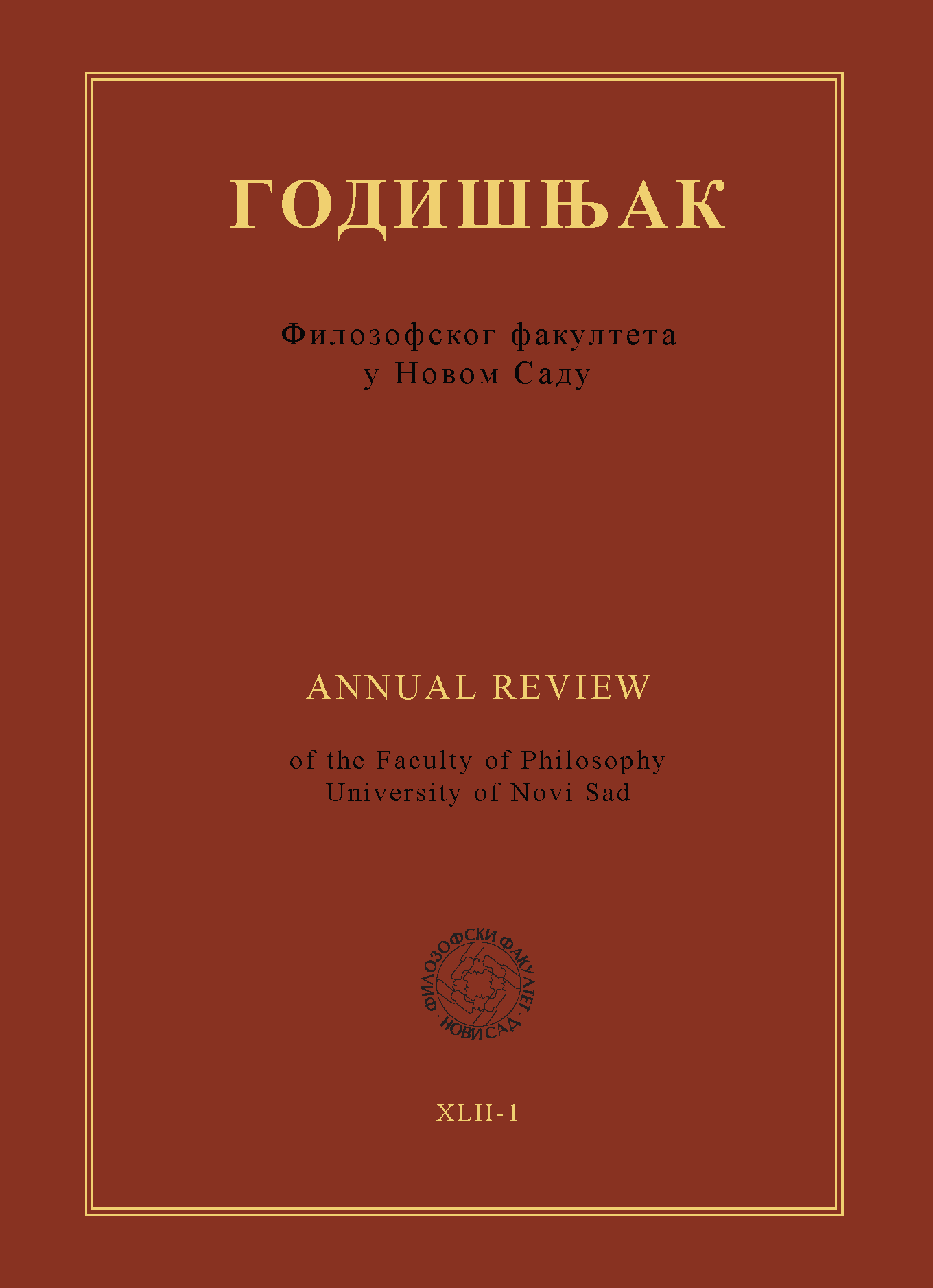The RESPONSIBILITY OF “TRANSMITTERS” TIMELINESS OF JÁNOS ARANY AND JOVAN JOVANOVIĆ ZMAJ’S TRANSLATOR DIALOGUE
Main Article Content
Abstract
On the occasion of the 200th anniversary of János Arany's birth, the translator concept and practice of the 19th century again merit special attention. The purpose of the paper is rereading Jovan Jovanović Zmaj's Toldi-translation. Zmaj was one of the keystones of the era's Serbian-Hungarian literary and cultural contacts. He translated Toldi in 1857, Toldi's Evening in 1870 and Toldi's Love in 1896 into Serbian. The Serbian translation of the epic work Toldi appeared in the first place in 1858 in the Medaković press in Novi Sad. The second edition of the translation appeared in 1910 being supplemented with Toldi's Love (Toldijina ljubav) and Toldi's Evening (Toldijina starost) in the edition of the Serbian Matica, and this text already reflects the new orthographic norm, the archaic Serbian writing style of the first edition being transcribed. The two stanzas of the prologue were left out from Zmaj's translation, however in the Serbian Matica edition it can be already read, and the notable introduction (translation in the translation) can be considered even as a guest text, namely this text is the translation of Blagoje Brančić living and learning for a while in Budapest. Zmaj in his first edition of text translation preserves the Péter Ilosvai Selymes mottos, but on Hungarian, he does not translate them. In the 1910 edition, the Hungarian recipient first confronts with the problem of deficiency, namely with the full absence of Ilosvai's motto.
The translator theory and practice of the 21st century open new perspectives for Arany's Toldi trilogy, as well as the interpretation of its Serbian translation. Both Zmaj and Arany emphasize the practical aspect of translation; do not treat translation as a theoretical problem. Both of them are poets, virtuosi of the language. About Zmaj's Toldi translation can be noted that he considers the foreign text as "starting point" of his own poem. The introduction of the study focuses on the translator concept of János Arany's age, later emphasizes some comparative literature phases, and finally, in connection with the target text, raises the problem of the boundaries and cultural aspects of translatability. The research is mostly aimed at the first fragment of the Toldi trilogy, though has a glimpse on rendering the whole trilogy as well.
Резиме на српском језику:
Odgovornost "prenosilaca"
(Aktuelnost prevodilačkog dijaloga Janoša Aranja i Jovana Jovanovića Zmaja)
Povodom 200. godišnjice rođenja Janoša Aranja zaslužuje pažnju da se ponovo bavimo koncepcijom i praksom prevođenja u 19. veku. Cilj studije je novo čitanje Toldija koje je preveo Jovan Jovanović Zmaj. Teorija i praksa prevođenja u 21. veku otvara nove perspektive za interpretaciju Aranjeve trilogije oToldiju, kao i njegovog srpskog prevoda. Uvodni deo rada je fokusiran na prevodilačku koncepciju vremena Janoša Aranja, potom ističe nekoliko komparatističkih momenata, i na kraju povodom ciljnog teksta obrađuje problematiku granica i kulturalnih aspekata mogućnosti prevođenja. Istraživanje je pre svega usmereno na prvi deo trilogije o Toldiju, ali se bavi i prevodom trilogije kao celine.
Downloads
Article Details
References
Aranj, J. (1910). Spev Jovana Aranja Toldija. Preveo: Zmaj Jovan Jovanović. Knjige Matice srpske, broj 32. Novi Sad: Matica srpska. (cirill betűs kiadás)
Arany, J. (1966). Összes költeményei. Budapest: Magyar Helikon.
Babić, S. (1984). Zmaj – a magyar költészet fordítója. Hungarológiai Közlemények, 58., 695‒710.
Benedek, M. (1970). Arany János. Budapest: Gondolat.
Bori, I. (1987). A XIX. századi magyar és szerb népiesség problémáiról. In: Bori I. (1987). Tanulmányok a magyar–délszláv irodalmi kapcsolatokról. Újvidék: Forum. 88–91.
Čurčić, L. (1984). A magyar irodalom az újvidéki Sedmica lapjain 1856 és 1858 között. In: Veselinović Š. M. (1984). Délszláv‒magyar irodalmi kapcsolatok II. Újvidék: A Magyar Nyelv, Irodalom és Hungarológiai Kutatások Intézete, 100‒106.
Dávid, A. (1970). Fejezetek a magyar–délszláv művelődési és irodalmi kapcsolatok köréből (főiskolai jegyzet). Subotica: A Pedagógiai Főiskola Jegyzetellátó Bizottsága.
Dávid, A. (1993). Egyazon égtájon. Fejezetek a magyar–délszláv és délszláv–magyar kapcsolattörténet köréből. Újvidék: A Magyar Nyelv, Irodalom és Hungarológiai Kutatások Intézete‒Forum.
Fried, I. (1984). Jovan Jovanović Zmaj – komparatisztikai szempontból. Hungarológiai Közlemények, 58., 677‒684.
Fried, I. (1984). Szerb‒magyar művelődési kapcsolatok (1849‒1867). In: Veselinović Š. M. (1984). Délszláv‒magyar irodalmi kapcsolatok II. Újvidék: A Magyar Nyelv, Irodalom és Hungarológiai Kutatások Intézete, 75‒86.
Hadzsics, A. (1869). Zmáj-Jovanovics János. A Kisfaludy-Társaság Évlapjai, 24. 45.
Herceg, J. (1957). Arany Toldijának százéves szerb kiadása. Híd, 3–4., 246–247.
Kozma, D. (1982). Arany János breviárium. Kolozsvár-Napoca: Dacia.
Milosevits, P. (1998). A szerb irodalom története. Budapest: Nemzeti Tankönyvkiadó.
Németh, F. (2014). Arany, Jókai és Petőfi kultusza a Vajdaságban. Szabadka: Magyar Tannyelvű Tanítóképző Kar.
Paz, O. (2007). Fordítás – Irodalom és irodalmiság. Kalligram, 2., 73–79.
Perényi Katalin (2016). Bábeltől az anyanyelvig. Octavio Paz és Kosztolányi Dezső fordításszemlélete a haikufordítások tükrében. Filológiai Közlöny, 1–2., 59–70.
Szegedy-Maszák, M. (2010). Kosztolányi Dezső. Pozsony: Kalligram.
Szunyogh, Sz. (1988). Arany János. Budapest: Garabonciás.




